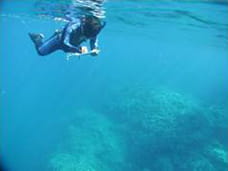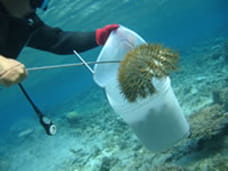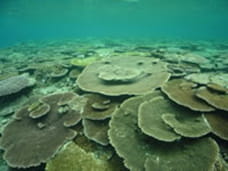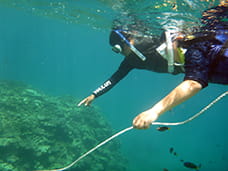Efforts of the Ministry of the Environment, Japan
Monitoring surveys in Sekisei Lagoon

We are investigating the coverage, species composition, and bleaching status of corals at a wide range of locations in Sekisei Lagoon. By conducting long-term surveys, we aim to understand how the coral reefs of the lagoon have changed over time.
We also conduct detailed surveys to analyze the effects of environmental stress (e.g., water temperature, salinity concentration, ultraviolet radiation, nutrient salt, and sedimentation) on the corals.
Restoration of coral reefs

When coral reefs are severely damaged, they may require some time for recovery. Thus, we support the resilience of nature by carrying out activities that support the restoration of coral colonies.
We also investigate the factors that affect the restoration of coral reefs and implement measures against those that hinder recovery.
Measures against crown-of-thorns starfish

There have been several outbreaks of crown-of-thorns starfish, each causing great damage to coral reefs and threatening the organisms that inhabit coral reefs, thereby disrupting the lives of people (directly or indirectly). To reduce the impact of such outbreaks, we monitor the occurrence and damage caused by crown-of-thorns starfish and work with local stakeholders to exterminate them. Additionally, we are investigating new methods for exterminating crown-of-thorns starfish safely and efficiently.
Land-based measures

The transport of red soil and wastewater from the land to the sea has an impact on coral reefs; this impacts can be observed easily, e.g., the deposition of red soil on ocean floor that may lead to coral-reef suffocation, or be subtle/unnoticed, e.g., the fluctuations in nutrient salt concentration. We conduct surveys on the impact of soil/wastewater transport on coral reefs. Additionally, we aim to disseminate the importance of land-based measures and lobby the related administrative agencies to promote effective initiatives.
Load measures related to the use of coral reefs

Coral reefs serve several purposes, including commercial and recreational fishing, diving, and underwater sightseeing. To reduce the environmental impact of these activities and ensure the appropriate use of coral reefs, we plan to designate coral-reef sea areas as marine national parks and create rules in cooperation with local stakeholders.
Public awareness and nature-interaction activities

We aim to encourage children to cherish and be proud of coral reefs and improve their understanding of and familiarity with the reefs, by allowing them experience the biodiversity of coral reefs in the ocean and comprehend our connection with the reefs in our daily lives. We organize nature observation sessions and on-site classes for children and provide environmental learning sessions in conjunction with their comprehensive learning time in elementary schools.
